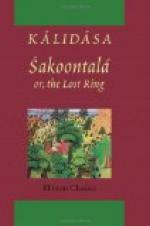And lest any one in this country should be sceptical as to the possibility of interesting a modern audience in a play written possibly as early as the third or fourth century of our era (see p. xvi), I here append an extract from a letter received by me in 1893 from Mr. V. Padmanabha Aiyar, B.A., resident at Karamanai, Trivandrum, Travancore.
’SIVEN Coil street, trivandrum,
’May 1, 1893.
’The members of the “Karamanai Young Men’s Mutual Improvement Society” acted your translation of “[S’]akoontala” on the 3rd and 5th of September last year, in the Government Museum Theatre, Trivandrum.
’It was acted in two parts. On the first day Acts I to iv were acted, and on the second the remaining three Acts.
’All our chief native officials and many Europeans and their ladies honoured the occasion with their presence. We acted it a second time at the special request of H.H. the Second Prince of Travancore, in the Palace of His Highness’ mother, the Junior Ranee.
’The public were kind enough to pronounce it a success. In many cases the applause given was not so much for the acting as for the beauty of your translation. The Hindus have a great liking for this play, and not one of the enlightened Hindu community will fail to acknowledge your translation to be a very perfect one. Our object in acting Hindu plays is to bring home to the Hindus the good lessons that our ancient authors are able to teach us. If there is one lesson in these days more than another which familiarity with the fountains of Western literature constantly forces upon the mind, it is that our age is turning its back on time-honoured creeds and dogmas. We are hurrying forward to a chaos in which all our existing beliefs, nay even the fundamental axioms of morality, may in the end be submerged; and as the general tenor of Indian thought among the educated community is to reject everything that is old, and equally blindly to absorb everything new, it becomes more and more an urgent question whether any great intellectual or moral revolution, which has no foundations in the past, can produce lasting benefits to the people.
’"I desire no future that will break the ties of the past” is what George Eliot has said, and so it is highly necessary that the Hindus should know something of their former greatness.
’The songs in [S’]akoontala, one in the Prologue and another in the beginning of the fifth Act, very easily adapted themselves to Hindu tunes.’
Towards the end of his letter Mr. Aiyar intimated that he himself took the part of Ma[T.]Havya. He also mentioned that a few modifications and additions were introduced into some of the scenes.
In a subsequent letter received from Mr. Keshava Aiyar, the Secretary of the Society, I was informed that my version of the Play was acted again at Trivandrum in 1894.




